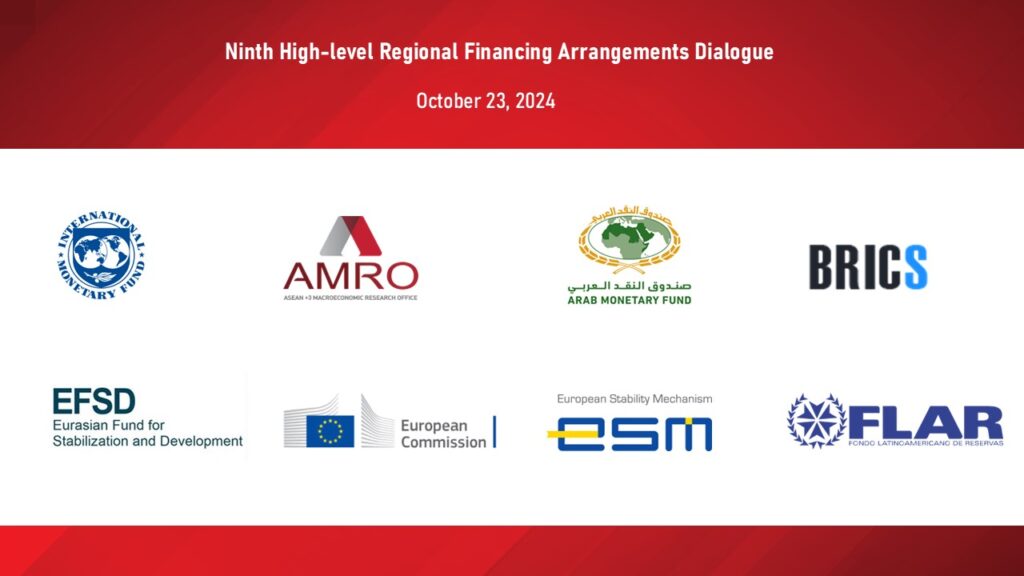
WASHINGTON DC, October 23, 2024 – The 9th High-level Regional Financing Arrangements (RFAs) Dialogue was held on October 23, 2024 in Washington DC at a time when the global economic outlook is improving but remains weak amid a complex geoeconomic environment and elevated policy uncertainty. The heightened volatility observed in global financial markets over the summer reaffirmed the importance of having a strong Global Financial Safety Net, including effective collaboration between the International Monetary Fund (IMF) and RFAs, to safeguard against external risks.
During the dialogue, representatives from the IMF and the RFAs (the Arab Monetary Fund, the ASEAN+3 Macroeconomic Research Office cum the Chiang Mai Initiative Multilateralisation, the BRICS Contingent Reserve Arrangement, the Eurasian Fund for Stabilization and Development, the European Commission, the European Stability Mechanism, and the Latin American Reserve Fund) provided an update on institutional activities since their last meeting in October 2023 in Marrakech, covering a range of issues from policy and instrument enhancements to capacity and analytical developments.
The exchange demonstrated the RFAs’ continued efforts to prepare their institutions for an uncertain economic and financial landscape, marked by risks of geoeconomic fragmentation, the threat of climate change, and a transforming global economy under the influence of artificial intelligence and digital progress.
The IMF is continuing to adapt to ensure that its policy advice, financial resources, and capacity development can best support its global membership. IMF staff updated RFAs on recent lending toolkit reforms that directly benefit its membership while reinforcing the IMF’s strong financial position. The recently completed Review of Charges and the Surcharge Policy reduces charges and surcharges on regular IMF lending, and the Review of the Poverty Reduction and Growth Trust puts in place a comprehensive package that secures the concessional lending capacity to support low-income countries. IMF staff also discussed how the institution is implementing its Climate Strategy across its operations. As the institution at the center of the global financial safety net, the IMF serves as a critical platform for cooperation to tackle global economic challenges.
The IMF and RFAs appreciated the exchange of views with Joaquim Levy and Siddharth Tiwari, in their capacity as members of the Bretton Woods Committee Multilateral Reform Working Group, on how to empower multilateralism amid geoeconomic fragmentation. The roundtable discussion offered an opportunity to explore the role that RFAs can play in advancing global solutions to shared challenges. The RFAs stressed that the IMF and the World Bank, with their global memberships and decades-long expertise, are best suited to take the lead in such efforts. The RFAs can support the Bretton Woods institutions’ work by leveraging their regional knowledge and the close ties that they have cultivated with each other and the IMF in recent years. Participants also welcomed the timely update from the French co-chair of the G20 International Financial Architecture Working Group on the group’s priorities, especially on its quest toward a more effective and representative global financial architecture.
Recognizing that the system of international cooperation is under strain, the IMF and RFAs reiterated their continued commitment to maintain an open and candid dialogue to share crisis experiences and expertise and support multilateralism.
The 9th Joint RFA Research Seminar will be held in Colombia in the first half of 2025. The 10th High-level RFA Dialogue will be convened at the margins of the next IMF/World Bank Annual Meetings in October 2025.
